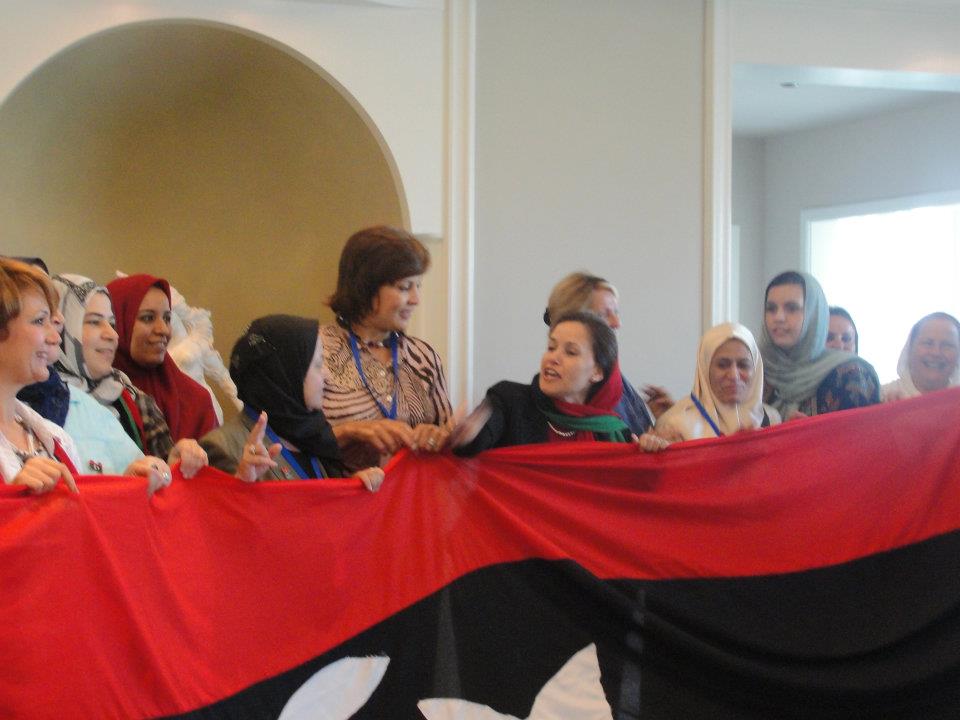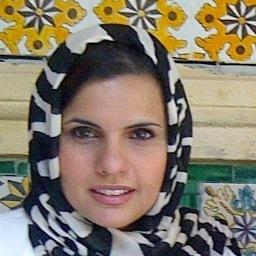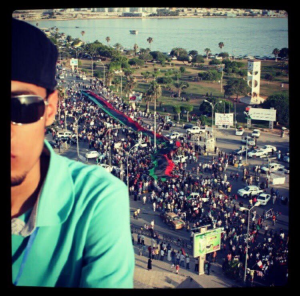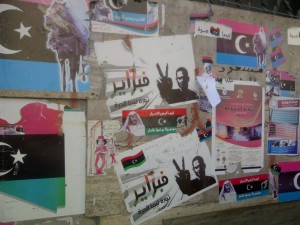Libya: from 17th february 2011 until 2017 – No regrets for toppling Ghadafi regime and diverse ideas for the future
Posted on: February 18, 2017, by : Editor
Gadhafi was toppled 6 years ago. When recalling that period I feel the smell of multiple cigarettes being inhaled at lightning speed and (prepaid) Nokia phones ringing constantly. Women and girls were constantly searching for Gaddafi-tanks who were being moved and hidden, printing leaflets and organising demonstrations. By the same token most women became DIY search and rescue teams “Have you seen Khadisha? She left for Misrata but we didn’t hear of her since?” “Damn, where is Fatiha, she was supposed to call in before 7 PM”. I was strolling through liberated Tripoli a few months afterwards: the streets filled with celebrating people and pick-up trucks with machine guns. However: the atmosphere at that time wasn’t aggressive but joyful. The walls were covered with posters from new political movements, concerts and the announcement of newly established radio stations.
I stayed in touch with a lot of people that helped topple Gaddafi. After 6 years I am asking several of them:
- Was the revolution worth it? Don’t you regret being part of a movement that helped topple Gaddafi?
- What do you think of the current situation?
- How do you envisage the future?
Zahra Langhi, Chair of the Libyan Women Peace Platform

Zahra, your entire family was deeply involved in the opposition against the regime. Just as countless other Libyans you have suffered many losses after the revolution, including the assassination of your friend and LWPP co-founder Salwa Bugaighis. Libya is now in a turnmoil, was the revolution worth it?
Of course it’s was worth it. It is always worth getting rid of despotism and dictatorship. Yes, the price is high. Of course there have been many mistakes, there is a lot of criticism and doubts about the many things that went wrong. The debate and self-criticism is healthy. Please understand: the current situation is not the end state. What happened since 2011 is a movement of social empowerment that cannot be reversed. The revolution is still taking place, it is still unfinished . It will be finished someday in the future.
What should happen now? A political solution?
What is needed today is much, much more than a political solution. The UN process and road maps always focus on political solutions in a top-down way. But we need to work in a bottom-up way, from the grassroots. We need to work on social, economical and cultural aspects too; political solutions are much too focused on institutions only. The elements that fuelled the revolution were much more diverse, it included the feeling of alienation, of estrangement, the lack of dignity, feelings of anxiety and anger. So we need to work on all of these aspects simultaneously and especially: collectively. Bottom-up, not top-down.
Hala Bugaighis

Dear Hala, you live in Libya and you were part of the movement that helped topple Gaddafi 6 years ago. What do you think of the current Libya? Was it worth it? Although many may disagree but I definitely think it was worth it. before the revolution Libyans had the fate of Sisyphus, we were doomed to live in absurdity. But the revolution gave us the chance to rebel against that fate, the chance to make change happens. So despite the fact that we live in a difficult times with the political division, insecurity and the economic crises but still we have the freedoms of speech, cultural movement, the raise of civil society and most importantly the hope of correcting all the wrongs and build the nation we dreamed of.
How do you see the near future of Libya?
In five years Libyans will realise that war is not the answer and will work to achieve the reconciliation and national healing, and start the effective development process in the country.
What should be done in your view?
Its time we all admit that the political agreement has failed, and start to make realistic solutions to end the political division and security issues in Libya.
Younes Nagem

Younes Nagem is an engineer living in Libya, he is the Chair of Bokra Foundation and Project Manager of LWPP.
You were part of the movement that helped topple Gaddafi 6 years ago, what do you think of the current Libya? Was it worth it?As one the people who was there participating in the toppling of Gaddafi regime, I wasn’t really have that long term vision of what going to happen when you success in the revolution. The real answer became clear to me and some other people after a year or less, where we were clearly seeing that the real is about to start and it’s about building a nation & country not just removing a bad regime. What’s happening right now in Libya is something expectable when the authorities and the role of rule are not effective yet. It’s something worth to fight for, It takes a lot of time and sacrifices to have the country that we dream about.
What do you think of the current situation?
The near future of Libya is not predictable, but we can see that it needs a lot of work from our side as Libyans, and the process must includes a lot of missing elements and factors (such a / fighting corruption and nepotism, human rights and peacebuilding, and openness with others experiences).
What should be done in your view?
What should be done in my small experience and the base that i’m connected to it through the works that I’m doing on the ground. It can be summed up in three major titles: ending the impunity and empower the rule of law ASAP, starting a nation building process on clear national constants, and get rid of violence and extremism by soft intervention ways not just the hard ones.
Shahrazad Kablan

What do you think of the current Libya? Was it worth it? John F. Kennedy once said, “Those who make peaceful revolution impossible will make violent revolution inevitable.” I truly believe that Gaddafi knew that and was determined to turn the Libyan people’s desire to reclaim their country in a peaceful manner impossible. The Libyan people were oppressed and living under constant restrictions of free thought and free speech and those are the most dangerous of all subversions. Libyans lived in terror, oppression, and suppression under Gaddafi. The Revolution was in the minds and hearts of the people and the collapse of the regime was because its brutality and corruption. It was not made somewhere; it came because it was born from the past evil that engulfed Libya for 40 plus years. Was it worth it? Of course it was.
Dear Ayat, we first met in 2011, you are a member of the influential Al Shabaab Libya movement ; the Libyan youth movement that played a crucial role in toppling Gaddafi 6 years ago. What do you think of the current Libya? Was it worth it?
As a young Libyan who engaged in toppling the regime six years ago, my hopes were for real change and a better future for Libyans. Today, Libya has not fulfilled the expectations that many had hope for.
Nonetheless, a dictator with a history of violence, corruption, and injustice that spanned over four decades and impacted the lives of several generations, is no longer in power. Libyans have to look deep within themselves if they are to reclaim their country and face the difficult task of putting it back together and building a Libya that is mindful of its history and committed to a future that is stronger for its unity and diversity.
How do you see the near future of Libya? What should be done in your view?
The near future of Libya will continue to see the struggles that have plagued it for the past few year, security will remain one of the foremost concerns as long as militias rule and weapons are the currency of power. A peaceful political solution cannot be reached without considering how to guarantee safety and security for all Libyans. Demilitarization efforts must take place.
Political players that have failed to seriously act to help the country move forward must stop stalling and know that the country has already put forth a mandate for what they’d like to see in Libya: all Libyans want guaranteed safety to live, to work, to pursue education, rights to basic personal freedoms. Libyans have already demonstrated immense resilience and talent, they merely need a country that reflects their best qualities.
|
|

. _____________________ Elisabeth van der Steenhoven Director KARAMA Europe

